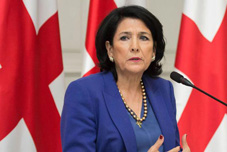
After almost four-month moratorium, president will pardon convicts for Christmas
By Nika Gamtsemlidze
Monday, December 30
After almost a four-month moratorium, President Salome Zourabichvili will pardon several convicts for Christmas. The pardoning will happen following the new rules.
This year, there have been many questions about the transparency of the president's pardon system. It was reported that in late August, the president pardoned a police officer accused of murdering a 15-year-old in 2015.
On September 18, a briefing was held in European Georgia, where Irma Nadirashvili said that cases related to pardonings, were resolved directly by the parliamentary secretary Dimitri Gabunia. On September 20, the Prosecutor's Office launched an investigation.
In connection with this accusation, Gabunia said he had nothing to do with these cases. He later said that the deputy head of administration had compiled a list of pardons.
Both the authorities and the opposition have been critical of the president's decisions. At the same time, pardoning convicts arrested for murder proved to be unacceptable to the ruling party MPs. After several days of criticism, the President's administration promised to work more on the pardoning rules. On September 18, she announced a moratorium on pardon.
At the end of November, it was announced that the new pardon procedure had been completed. The new criteria will significantly reduce the number of pardoned inmates.
According to the Presidentís administration, they set out new rules for serious and especially grave crimes. They also simplified terms of dealing with convicts for less serious crimes.
The President will use the power in special and outstanding individual cases, which will result in a significantly reduced number of pardons.
According to the administration, before making a final decision on a pardon, the President will once again consult with relevant state agencies and industry experts on each case.
During Giorgi Margvelashvili's presidency (2013-2018), the Pardon Commission worked as follows: Applications for pardoners and materials about them were collected at the commission where they were fired. Then the list was submitted to the President.
The criteria by which the previous president's commission assessed the appropriateness of pardoning: Crime; prisonerís past; deportment at the jail; recommendation; report of a social worker and the position of the victim and the family. By the current law, the President has the right to pardon any person without any criteria.
The Presidentís Pardon Commission is composed of 11 individuals-mainly, lawyers from the civil sector, public figures, the Public Defender and a spiritual representative from Georgiaís Patriarchate. The group must discuss all cases sent to the Pardon Commission by inmates or their families and decide which prisoners they believe deserve to be pardoned. The list is then sent to the president to be signed.


